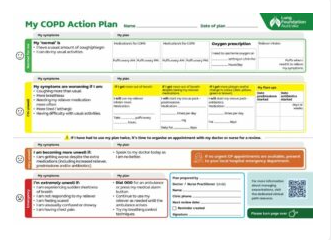A COPD flare-up is the worsening of your COPD symptoms. For many living with COPD, flare-ups can have a huge impact on your life. Each flare-up does long-term damage to your health. All people living with COPD are at risk of experiencing a flare up or exacerbation. It’s important to know your baseline, recognise a flare-up and have an action plan in place so you know what steps to take.
Each person experiences COPD differently. In the early stages of the condition, some people may not experience much impact on their life or emotions. Others feel they need more help to be independent, particularly during an exacerbation (flare-up of symptoms) or as their disease progresses. It is also common to experience changes in your mood such as depression or anxiety. However, it is important to remember there are support services you can access, including pulmonary rehabilitation and support groups, which help you learn about your condition, and improve your wellbeing.
Symptoms of a COPD flare-up
It is crucial to know how to avoid your flare-ups, what the signs and symptoms are that you may experience, and how to minimise the impact. This will assist with your day-to-day life living with COPD.
The key symptoms of a COPD flare-up include:
- Coughing more than usual
- Finding it harder to breathe than usual
- Any change in sputum (phlegm)
- Feeling more tired and less active than usual
- Fatigue
- Loss of appetite
- Difficulty sleeping
- Taking more of your reliever medication than normal.
Using you COPD Action Plan to avoid flare-ups

A COPD Action Plan is a simple guide that helps you take care of your COPD. The plan aims to help you recognise a flare-up earlier and provides instructions to reduce the severity and duration of your illness. It is best used when completed with your GP, specialist or nurse. It helps you know what medicines to take every day, what to do if you feel worse, what to do when you anticipate a flare-up and when to source medical assistance.
COPD triggers
COPD triggers, something that triggers or actively worsens your condition, can sometimes be avoided. Understanding your triggers, then using your Action Plan (outlined above) to reduce these triggers is an important step to controlling COPD.
The most common triggers include:
- Smoke
- Strong odours, chemicals
- Air pollution and pollen
- Respiratory or lung infections.
How to avoid your flare-ups
In addition to creating and following your COPD Action Plan, there are various things you can help avoid flare-ups. These include:
- Learn what your personal triggers are and how to avoid them
- Stay inside on especially hot or cold days if possible
- Avoid second hand smoke
- Avoid strong cleaning products or perfumes
- Ensure your vaccinations are up to date
- Follow your doctor’s medicine plans.
What to do if you become sick
When you start to become unwell, it is important that you act and follow your Action Plan quickly. This will help you feel better quicker and avoid a trip to hospital. If you become sick:
- Follow your Action Plan steps
- Reduce your activity level
- Practice controlled breathing and relaxation techniques
- Eat small mouthfuls of nourishing food
- Follow your doctor’s guide for medicines
- Contact your healthcare team if your flare-up becomes severe.
If you’re living with COPD and would like more information about managing your condition, make an appointment with our highly experienced Respiratory Care Nurse. Through this free telephone service, our skilled nurses can provide guidance on all aspects of your condition according to the management guidelines. Make an appointment via the button below or free call 1800 654 301.


